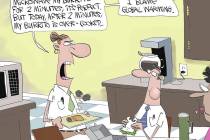It’s not about civility, balance
One morning in the early Clinton days I was asked to appear on a CNN program -- now defunct, happily -- called "Crossfire."
There was a liberal host and a liberal guest who argued the issue of the day with a conservative host and a conservative guest.
By mid-afternoon, in a second preparatory phone briefing with the producer, I got bumped.
All I can tell you is that this producer said I was not strident enough as the liberal guest, the position for which I had been pegged, to balance the stridency of the guest on the right.
Then there was that election night when the local television station's anchorman referred to one of the on-air analysts, the more conservative, as representing Republicans and to me as representing Democrats.
I demanded a retraction. Election analysis is not partisan. Vote totals are vote totals.
I was representing only myself, not any partisan person or group. If I leaned more to the Democratic side than the Republican in my general views, as I acknowledged, it was by honest circumstance, not by design or assignment or predetermination or prejudice.
These reminiscences came to me last week as I pondered three things -- the debate over civility, Joe Lieberman's retirement and the prospect of a few Democrats and Republicans sitting together during the State of the Union address Tuesday night.
The cancer on our political dialogue is not incivility, but partisan stereotyping by which honest expression of independent thought is not permitted, or at least not valued, and certainly not encouraged.
To the contrary, we have evolved into a system of emphasis on forced and faux "balance" by which persons are condemned, essentially, to neutralize each other, to geld each other, by representing and expressing reliably partisan and wholly juxtaposed positions.
Actually, a fair-minded politician or pundit would not require balancing by an outside party. He or she would provide that balance internally by personal fairness and by attention to detail and context.
Thoughtful opinions do not need to be balanced. They need to be considered. Political virtue is not to be found in forced symmetry. It is to be found in free thought and free expression and in the alliances that ensue naturally from them.
Those of you who send me messages from time to time saying that you hate to admit it, but that you agree with me on something ... why, I wonder, do you hate it? Is it me you hate? Or is it agreement you hate? Or do you hate that an idea could transcend your comfortable personal bias?
So now we have Joe Lieberman, who, in announcing last week that he will not run again, pointed out that his stew pot of views was much like that of John F. Kennedy, and that JFK would not be a reliable Democrat anymore.
Support for an activist and muscular defense, in Afghanistan and Iraq; support for tax cuts; championing of social justice by which he led the fight for open homosexuality in the military -- this combination of positions had Lieberman ostracized by his natural Democratic allies and distrusted by Republicans.
JFK advocated an activist and muscular defense in missile development and in Vietnam and toward Cuba. He advocated across-the-board reductions in income tax rates. He championed civil rights.
Lieberman's presumptuous comparison was not so off-base.
He said it was not that he was leaving politics, but that politics had left him.
So on Tuesday night a few members of Congress of Democratic and Republican persuasions intend to sit next to each other rather than in the usual patterns clearly delineating the strident and sometimes artificial separation of partisanship.
It will be dismissed as modest symbolism. But we desperately need less of that ever-balanced crossfire. Too many good people and good ideas get caught in it.
John Brummett is an award-winning columnist for the Arkansas News Bureau in Little Rock and author of "High Wire," a book about Bill Clinton's first year as president. His e-mail address is jbrummett@ arkansasnews.com.























